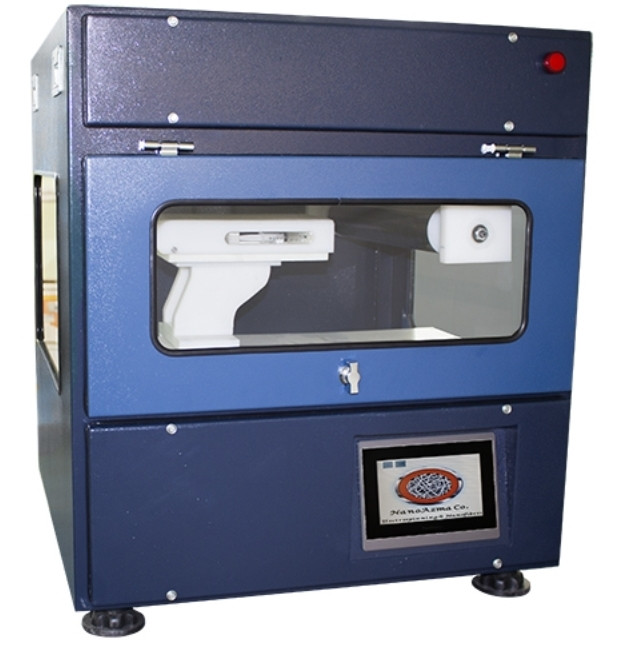A) Processing Equipment |
||
|
Twin Screw Extruder Polymer lab is equipped with a bench-top co-rotating extruder with length to diameter ratio of 23. Easy handling and wide range of rpm enables the equipment to be employed for melt compounding of different kinds of thermoplastics and fillers/reinforcements. |
 |
|
|
Internal Mixer A Brabender Plastograph is used as internal mixer in the lab. This mixer is most commonly used for polymeric materials that require a strong shear force to form a homogenous melt such as thermoplastics, and many thermosetting resins such as phenolics and epoxies. |
 |
|
|
Hot Press The 15 ton hydraulic press is equipped with a manually operated oil pump. Two digital controllers are employed for controlling the temperatures of up and down heating platens, individually. Incorporation of a digital time controller has enabled programing of the press for different curing cycles. |
 |
|
|
Ultrasonic Homogenizer The instrument is capable of homogenizing 2 to 50 ml samples. It consists:
|
 |
|
|
Electrospinning (Electrostatic Fiber Spinning) Polymer lab is equipped with an Electrospinning (electrostatic fiber spinning) machine manufactured by Nanoazma. This device provides many possibilities for the researcher to process common types of nanofibers, ceramics, hybrids, holofibers, two-component fibers, combine fibers with one, two, or three independent polymers at a time. |
|
|
B) Sample preparation Equipment |
||
|
Scratcher Scratch hardness is one of the standard evaluation techniques for measuring the mechanical performance of polymeric surfaces. This home-made apparatus is used for introducing scratches to the polymer surface as part of the testing protocol according to ASTM G171-03. |
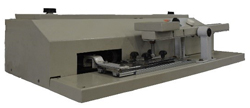 |
|
|
Micro Cutter Precision table top cut-off machine is used for precise and deformation-free cutting. The Struers cuter is equipped with a sample rotation/oscillation head. Pre-set constant feed speed can be applied in the range of 0.005 - 3.00 mm/s. |
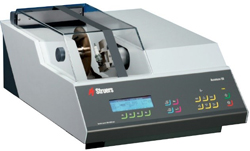 |
|
C) Characterization Equipment |
||
|
Melt Flow Index Tester Melt flow index (MFI), also called melt flow rate (MFR), is a practical measure of flow-ability of polymer melts. The device can measure MFI at different temperatures and under different loading levels. |
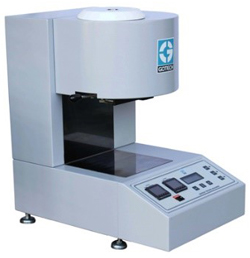 |
|
|
Heat Deflection Temperature Tester Performance of polymers at high temperature service conditions is evaluated based on their heat deflection temperature (HDT). The instrument is capable of heating up a bending bar at a specific heating rate while the sample is under a given load. HDT is then reported based on a certain flexural displacement occurred. |
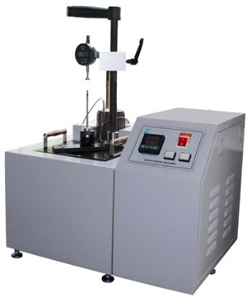 |
|
|
Differential Scanning Calorimeter Differential Scanning Calorimeter (DSC) is a basic thermal analysis device which has a very wide range of applications in polymer science and engineering. Studying glass transition, melting behavior and crystallization characteristics of polymers are among the major applications of the equipment. |
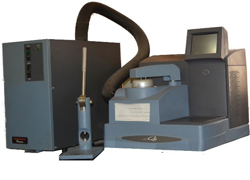 |
|
|
Optical Microscope The OLYMPUS BX51 research microscope is a union of Olympus infinity corrected optical systems (UIS2 – universal infinity system) and advanced fluorescence or differential interference contrast DIC (Nomarski) technology. |
 |
|
|
Universal Testing Frame A 10 KN Hounsfield universal testing frame is used for mechanical characterization of polymers in the lab. The bench-top instrument is equipped with hardware and software required for tensile, compression and flexural tests of plastics and rubbers. A long-travel extensometer and a fine load-cell (500 N) are also available for precise measurement of displacement and force. |
 |
|
|
Pendulum Impact Tester Impact testing is a highly practiced evaluation technique in plastics industry which reflects the resistance of materials against dynamic loads. The bench-top pendulum impact tester is capable of doing Charpy impact test on rigid plastics. Three hammers providing different energy levels of 1, 5 and 20 J enable the lab to evaluate the impact resistance of the entire range of plastic blends and composites. |
 |
|


